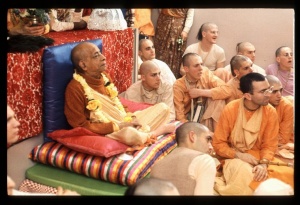CC Antya 3.147: Difference between revisions
m (1 revision(s)) |
No edit summary |
||
| Line 1: | Line 1: | ||
{{ | [[Category:Sri Caitanya-caritamrta - Antya-lila Chapter 03]] | ||
<div style="float:left">'''[[Sri Caitanya-caritamrta|Śrī Caitanya-caritāmṛta]] - [[CC Antya|Antya-līlā]] - [[CC Antya 3|Chapter 3: The Glories of Śrīla Haridāsa Ṭhākura]]'''</div> | |||
<div style="float:right">[[File:Go-previous.png|link=CC Antya 3.146|Antya-līlā 3.146]] '''[[CC Antya 3.146|Antya-līlā 3.146]] - [[CC Antya 3.148|Antya-līlā 3.148]]''' [[File:Go-next.png|link=CC Antya 3.148|Antya-līlā 3.148]]</div> | |||
{{CompareVersions|CC|Antya 3.147|CC 1975|CC 1996}} | |||
{{RandomImage}} | |||
==== TEXT 147 ==== | ==== TEXT 147 ==== | ||
<div class="verse"> | |||
<div | :vaiṣṇava-dharma nindā kare, vaiṣṇava-apamāna | ||
vaiṣṇava-dharma nindā kare, vaiṣṇava-apamāna | :bahu-dinera aparādhe pāila pariṇāma | ||
bahu-dinera aparādhe pāila pariṇāma | |||
</div> | </div> | ||
| Line 13: | Line 16: | ||
==== SYNONYMS ==== | ==== SYNONYMS ==== | ||
<div class="synonyms"> | |||
<div | ''vaiṣṇava-dharma''—the cult of Vaiṣṇavism; ''nindā kare''—blasphemes; ''vaiṣṇava apamāna''—insults to the devotees; ''bahu-dinera''—for a long time; ''aparādhe''—by offensive activities; ''pāila''—got; ''pariṇāma''—the resultant action. | ||
vaiṣṇava- | |||
</div> | </div> | ||
| Line 21: | Line 23: | ||
==== TRANSLATION ==== | ==== TRANSLATION ==== | ||
<div class="translation"> | |||
<div | |||
Because of blaspheming the cult of Vaiṣṇavism and insulting the devotees for a long time, he now received the results of his offensive activities. | Because of blaspheming the cult of Vaiṣṇavism and insulting the devotees for a long time, he now received the results of his offensive activities. | ||
</div> | </div> | ||
| Line 28: | Line 29: | ||
==== PURPORT ==== | ==== PURPORT ==== | ||
<div class="purport"> | |||
Rāmacandra Khān was a great offender at the lotus feet of the Vaiṣṇavas and Viṣṇu. Just as Rāvaṇa, although born of a ''brāhmaṇa'' father, Viśvaśravā, was nevertheless called an ''asura'' or ''Rākṣasa'' because of his offenses against Lord Rāmacandra (Viṣṇu) and Hanumān (a Vaiṣṇava), so Rāmacandra Khān also became such an ''asura'' because of his offenses against Haridāsa Ṭhākura and many others. | |||
</div> | |||
<div | <div style="float:right; clear:both;">[[File:Go-previous.png|link=CC Antya 3.146|Antya-līlā 3.146]] '''[[CC Antya 3.146|Antya-līlā 3.146]] - [[CC Antya 3.148|Antya-līlā 3.148]]''' [[File:Go-next.png|link=CC Antya 3.148|Antya-līlā 3.148]]</div> | ||
__NOTOC__ | |||
</div> | __NOEDITSECTION__ | ||
__NOTOC__ | |||
Revision as of 05:45, 29 September 2021

A.C. Bhaktivedanta Swami Prabhupada
TEXT 147
- vaiṣṇava-dharma nindā kare, vaiṣṇava-apamāna
- bahu-dinera aparādhe pāila pariṇāma
SYNONYMS
vaiṣṇava-dharma—the cult of Vaiṣṇavism; nindā kare—blasphemes; vaiṣṇava apamāna—insults to the devotees; bahu-dinera—for a long time; aparādhe—by offensive activities; pāila—got; pariṇāma—the resultant action.
TRANSLATION
Because of blaspheming the cult of Vaiṣṇavism and insulting the devotees for a long time, he now received the results of his offensive activities.
PURPORT
Rāmacandra Khān was a great offender at the lotus feet of the Vaiṣṇavas and Viṣṇu. Just as Rāvaṇa, although born of a brāhmaṇa father, Viśvaśravā, was nevertheless called an asura or Rākṣasa because of his offenses against Lord Rāmacandra (Viṣṇu) and Hanumān (a Vaiṣṇava), so Rāmacandra Khān also became such an asura because of his offenses against Haridāsa Ṭhākura and many others.